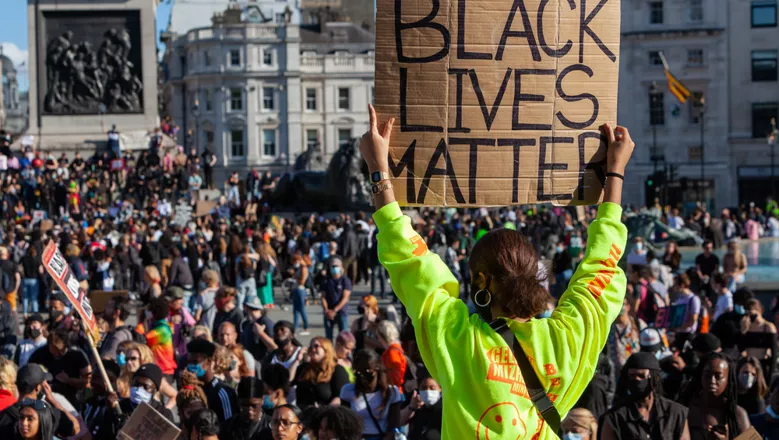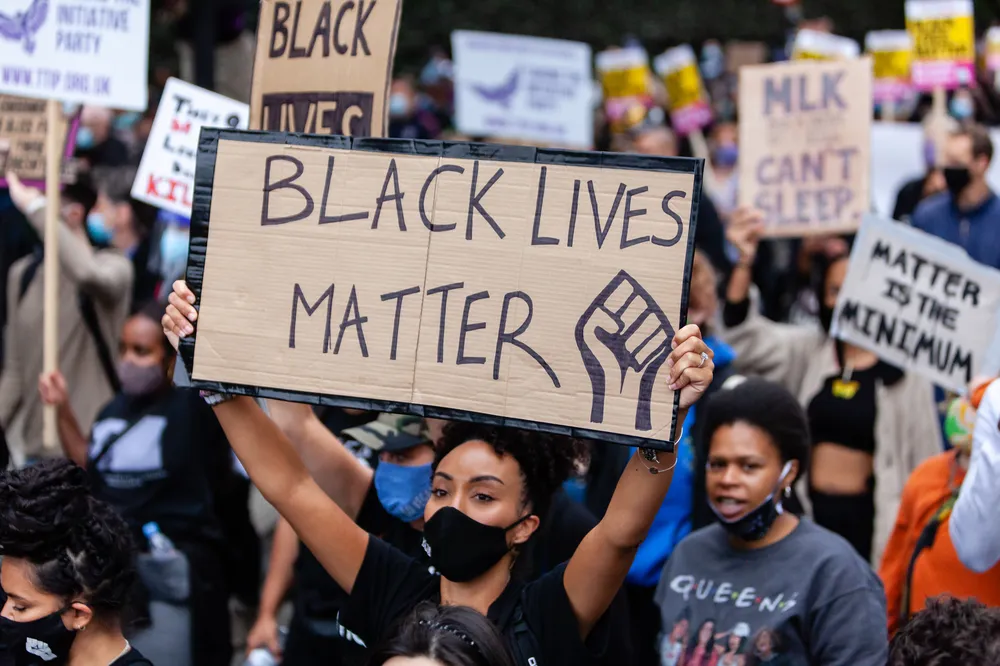We wanted to build on existing work identifying ongoing problems and calling for change often spearheaded by student groups such as KCL Intersectional Feminist Society. Our student body reflects London’s population with significantly more Black and BAME members compared with staff. Supporting these voices through research funding has the potential to change faculty culture.
Dr Zoe Norridge, Pro-Vice-Dean for Impact and Innovation
04 October 2020
The Arts & Humanities researchers rethinking King's approaches to Black Lives Matter
The KCL Arts & Humanities research team recently awarded six rapid response grants to scholars from across the Faculty engaging with Black Lives Matter and forms of anti-Asian racism connected with the global pandemic.

In the wake of police killings of Breonna Taylor in March and George Floyd in May 2020, Black Lives Matter protests gathered momentum across the world. Student societies at King’s called for action and Heads of Department reached out to students acknowledging that UK Higher Education, including King’s, has a great deal of work to do in addressing racism.
Echoing our college-wide response to COVID-19, the KCL Arts & Humanities research team recently awarded six rapid response grants to scholars from across the faculty engaging with Black Lives Matter and forms of anti-Asian racism connected with the global pandemic.
Different ways of working
The Faculty research team were inspired by student leadership in anti-racism initiatives to open up these grants to undergraduates and postgraduates as well as staff.
The majority BAME Awarding Panel included paid undergraduate and postgraduate members who advised on process and engagement in addition to making funding decisions. Niya Namfua, a third year History and International Relations undergraduate who sat on the panel commented: “I am confident this initiative was a step towards understanding and addressing racism at King's. Being on panel, it was evident from the diverse project ideas that this issue affects the faculty at every level.”
Throughout the BLM funding call’s preparation and panel’s decision-making discussion, both staff and student voices were heard. I believe we are collectively making substantial changes to fight against racism in the institution.
Liang Ge, a doctoral candidate in CMCI
Dynamic awards that could lead to lasting change
Nineteen excellent projects were received, of which six went on to receive funding. Panel member Ruvani Ranasinha, A&H Diversity and Inclusion Lead, commented, “the wide range of topics of the innovative and creative projects we evaluated was impressive indeed”.
Anna Reading, Director of the Arts and Humanities Research Institute and fellow panel member said her colleagues welcomed these new approaches and explained: “Our involvement in supporting the call is positively changing what we do. We’re developing new resources for award holders, and have begun addressing our own diversity and inclusion through an audit of all our work this Autumn.”

The projects
50 Faces of King’s
Ehis Ilozobhie (German) is exploring how Black students and alumni navigate King’s through a combination of portrait photography and storytelling. The project questions the visibility and versatility of Blackness at our institution, analysing the predominance of narratives about “Black excellence” and creating more space for the “everyday”. By showing the range of Black faces at King’s it aims to shift perceptions of the university as a predominantly White space.
Embracing Africana Philosophy
Naomi Snow (Philosophy & Mathematics) is addressing the Eurocentric bias in Philosophy education through highlighting and re-empowering the techniques and concepts of African Philosophies. Adopting an Afro-futurist approach, the project develops a new conception of Philosophy able to address the epistemic exclusion of minority voices through analysis of existing curriculum and exploration of new approaches that would foreground alternative knowledge systems.
Tackling the Systematic Invisibility of Asia in CMCI Education
Takao Terui, Karin Chau and Hye-Kung Lee (CMCI) are addressing the gap between the substantial presence of Asian students and the systematic absence of Asian perspectives in courses convened by the Department of Culture, Media and Creative Industries. Their work employs interdisciplinary approaches including interviews, syllabus surveys and alternative course development to engage staff and students in decolonising the CMCI MA curriculum.
Obsidian Poetry Project
Obsidian is a Black poetry organisation founded by Ugandan poet and KCL PhD candidate Nick Makoha (English). In collaboration with external writers and cultural producers, Makoha is creating an online poetry retreat for Black writers to explore their creativity away from the stereotypes that constrict their work. Open to poets and Black KCL students, the workshop will provide a clearing for conversation and research the value of the non-racist writing space.
Racism as a Virus
Victor Fan (Film Studies) and Wing-Fai Leung (CMCI) are responding to the 20% rise in anti-Asian hate crimes during the COVID-19 pandemic (Grierson 2020) to explore how figurations of the “Chinese virus” are reflecting longstanding institutionalised racism. Qualitative data will be used to inform collaborative academic/artistic events (performance workshops and roundtables) that explore “Body and Performance” and “Asia as a Method”.
Abolitionist Curriculum
Josh Davies, Jon Ward and Hannah Crawforth (English) are developing new “Abolitionist Curriculum” for the English department exploring colonialism, slavery and its legacies that directly inform the Black Lives Matter debates. This curriculum will then be developed in partnership with London state schools building on the model of an existing second-year module that involves teaching collaborations with a local comprehensive in order to create a “flipped classroom”.
